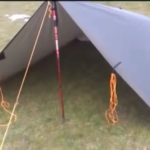How to Make a Rudimentary Slingshot out of PVC Pipe
There are a lot of ways to make slingshots, but few are as easy as the one described below. If you have some PVC pipe, duct tape and thick rubber bands, you can make one in just a few minutes. Let’s take a look at this simple process that may be good to know if you’re ever in a situation where a slingshot is the best option to hunt for your next meal.
Required Items
At least a 7 inch length of PVC pipe that is 1” in diameter
Heat gun or blow dryer
Duct tape
Thick rubber bands
Hacksaw or knife to cut the pipe
Getting Started
The first step is to mark a vertical line that goes from the top of the pipe to at least three inches down. Next, make a horizontal line that will intersect the bottom of the vertical line ½ way around the outside of the pipe. You should have what looks like an upside down “T”. Next, cut a slit on both sides of the pipe by starting over the top. Follow the vertical line until a gash exists on opposite sides of the pipe. You don’t need to cut along the horizontal line. This is just used for guidance to give you a frame of reference.
Heating and Shaping the Pipe
The next step is to heat the pipe along the area that you cut as well as about an inch below the horizontal line. The goal is to heat the PVC to the point where it will bend without melting or burning.
Using a heat gun or blow dryer is the safest option as they usually don’t generate enough heat to melt or scorch the material. You can also use a blow torch to soften the area, but it’s important to keep the flame at a safe distance along with keeping it moving around the material.
Once the pipe has been heated and softened, cover it with a hand towel, pot holder or wear thermal gloves. Gently pull apart each side of the cut plastic until it forms the shape of a “Y”. You may need to either reheat or allow the material to cool as the case may be. If it is too hot, allowing it to cool will help the material to retain its shape as it firms up. Adding more heat will make it more pliable. It may take a little bit of practice and trial and error until you find the right rhythm.
Once the pipe has been formed, allow it to cool. Consider placing a stick in the center so that it can hold the mouth of the “Y” open instead of springing back closed if necessary. Once the pipe has completely cooled, you can start to attach the rubber bands.
Attaching the Bands
Remember that you want to work with really thick and durable rubber bands. You can also use rubber from an inner tube or other source that gives you a firm, springy and stretchable sling. All you really need to figure out is how long you want the sling to be and how much force the rubber can withstand before tearing. Adjust accordingly, and you can also scale up and down on the PVC pipe in order to adjust the size of the slingshot.
For rubber bands, you can make the sling longer and stronger by using a few of them. Cut the rubber bands so they form straight strips. Place one on top of another so about an inch of each piece are overlapping. Tape this section in place with a few strips of duct tape to secure it together. This can also be used as a basket for your sling as well, so feel free to customize this connection as you see fit. You can make more than one connection for larger slingshots, but make sure they are secure so they don’t fall apart when you pull the sling back before firing.
Once you’ve decided on the appropriate length, double up on the rubber bands to create a dual sling. You can also double up on the rubber material if you desire. Just remember that if you make it too thick and tense, then it will be harder to pull back the sling and get an effective launch of the projectile.
All you need to do now is place the ends over each side of the sling and secure them with some duct tape. You can either lay them flat or wrap them around the sling for additional strength. If you wrap the rubber around the sides of the slingshot, consider putting a piece of tape around the edge. This will protect the rubber from being cut by the rough plastic edges on the inside of each arm. In any case, make sure to apply enough tape and find the best placement in order to hold everything together.
That’s it. Take out your slingshot and give it a test run. You will quickly figure out what adjustments need to be made, if any, and end up with a quality and effective weapon. Try it for yourself and see how this simple project may be worth its weight in gold if you need to improvise a way to hunt.


















